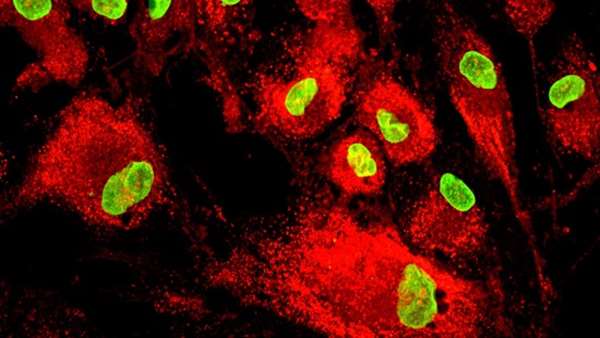Stem Cells’ Consumption of ‘Sweets’ Helps Them Fight Inflammation
A new study published in STEM CELLS Translational Medicine shows that the energy metabolism of human mesenchymal stem cells (hMSCs) can be targeted to increase their ability to enhance tissue regeneration. The study offers a strategy that has immediate translational potential for improving hMSCs’ therapeutic success.
A new study published in STEM CELLS Translational Medicine shows that the energy metabolism of human mesenchymal stem cells (hMSCs) can be targeted to increase their ability to enhance tissue regeneration. The study offers a strategy that has immediate translational potential for improving hMSCs’ therapeutic success.
hMSCs have gained significant interest as an “off-the-shelf” product for cell therapy in various types of diseases. Recent findings suggest that instead of replacing damaged cells through differentiation, as initially thought, hMSCs promote tissue regeneration by coordinating multiple components of the host immune system via the release of immunomodulatory factors. Therefore, understanding the mechanism underpinning hMSC immune polarization and secretory function is critical to enhancing their therapeutic outcome.
In the study in STEM CELLS Translational Medicine, a research team led by Teng Ma, Ph.D., a Florida State University researcher at the FAMU-FSU College of Engineering reported that hMSC energy metabolism plays a central role in regulating their immunosuppressive properties, which is the focus of current investigations in hMSC clinical applications.
“While the critical role energy metabolism plays in modulating and potentially dictating immune cell function is clearly established, we investigated whether energy metabolism plays a similar role promoting hMSCs’ anti-inflammatory properties in response to inflammatory stimuli,” Dr. Ma said. “We found that, in the presence of these stimuli, hMSCs reconfigure their energy metabolism toward a primarily glycolytic phenotype and that these metabolic changes are required to support the production of the key immunosuppressive cytokines.”
What this means is that increased glucose uptake and consumption enhance the immunosuppressive effects of hMSCs, suggesting their energy consumption can be targeted to augment hMSCs’ therapeutic outcome.
“Preserving hMSCs’ therapeutic potential is a critical barrier in the translation of hMSC to clinical applications, so this study provides a sound scientific basis for the development of a novel approach to enhance the therapeutic potential of hMSCs,” Dr. Ma added.
The work is a collaboration with Tim Logan, Ph.D., a biochemist at FSU.
“The immunomodulatory properties of human mesenchymal stem cells have attracted significant interest in clinical applications,” said Anthony Atala M.D., Editor-in-Chief of STEM CELLS Translational Medicine and director of the Wake Forest Institute of Regenerative Medicine. “This study offers a strategy that has immediate translational potential for controlling their specific immunomodulatory properties and therefore improve their therapeutic efficacy. We look forward to seeing the progression of this research.”
Reference:https://stemcellsjournals.onlinelibrary.wiley.com/doi/full/10.1002/sctm.18-0070





ارسال به دوستان